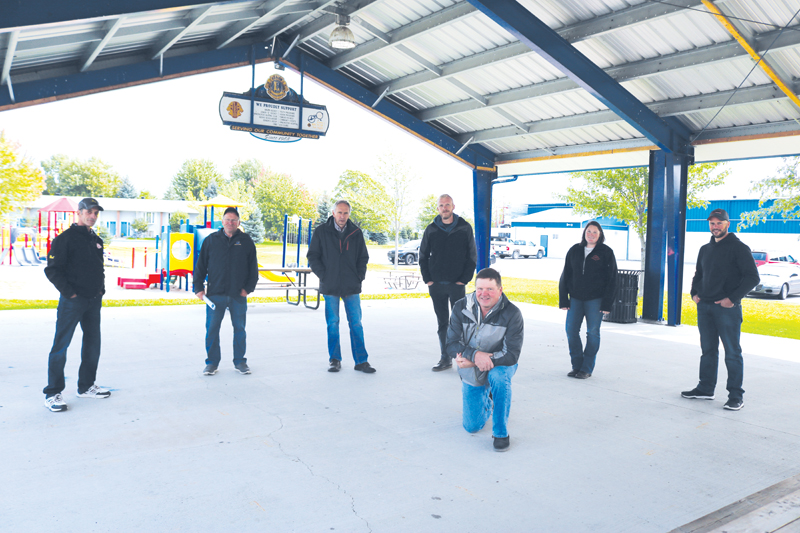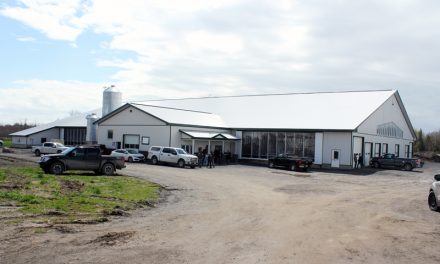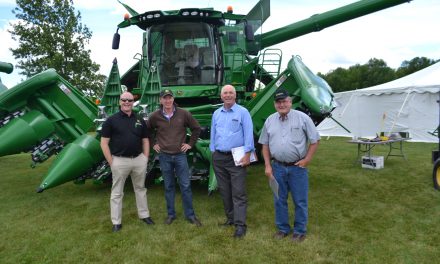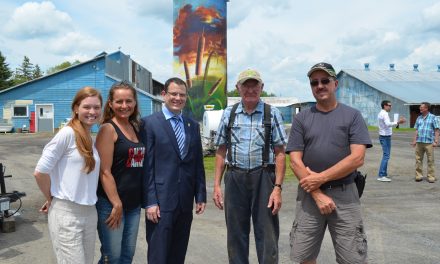Nation Valley Pork Producers directors met in Winchester, Ont. on Tues., Sept. 15. Complying with the Covid-19 rules, the meeting was held outside. This was the first meeting the directors have held since before Covid19 to discuss procedures that Ontario Pork has requested information on.
Vogel photo
by Dr. Sue Burlatschenko
Diplomate ABVP, MPH, Ontario Pork
Special to The AgriNews
WINCHESTER – Raising pigs on a small scale can be rewarding for those who enjoy animal husbandry and having home-raised meat in the freezer. Before starting with your own pigs, there are a few considerations that will make your efforts simpler.
First, you should think about where you will take your pigs when the time comes to have them butchered and how you will transport them to that location. What weight of pig would be good for you? A commercial pig will weigh about 130 kg live before butchering, and produce about 101 kg of meat. Remember that pigs are social, and you’ll likely want two. You may then want to produce a lighter-weight pig, or sell a part of it. Thinking ahead about these things will save a bit of last minute scrambling.
You can source pigs directly from commercial swine operations which may have extra pigs for sale for your purposes. There are livestock auctions where young pigs can be purchased, but buying direct is best for pig health. It is better to buy small scale pigs at a weight of 25 kg or so, as they are hardier and easier to keep at this size than smaller pigs.
Think about pig housing too. Understanding pig behaviour will help with the design of your pig facilities. Pigs will need shelter from the elements. A small barn or shed is good. Are they going to be kept inside or allowed to roam outside in a pen? If they are inside, having a “piggy box” is a great idea for colder weather. The box should have three sides and a roof, and be high enough so that the pigs can’t bump against it. The box can be filled with straw or shavings, and the pigs will have a nice little nest. Pigs like to burrow when cold, so bed them well in cold weather. Remember to clean the pen and the box regularly. Pigs are actually quite tidy and don’t like to sleep in a dirty area.
Pigs that have access to the outdoors will need sturdy fencing, as pigs are very capable of deconstructing pens and getting loose. Having an electric wire on the inside of the fence will help keep the pigs away from the fenceline. Whether indoors or outdoors, think about manure disposal (yes, you will have to clean pens) and where you are going to put it.
Pigs do enjoy a wide variety of feedstuffs in their diet. Although they will dine on grasses if on pasture, it is not sufficient to allow for growth and health. Pigs require a grain base to grow properly. This base is easily purchased as a commercial swine diet which is found in most livestock feed outlets. You can talk to your livestock veterinarian or the feed company about the different stages of feeding pigs. Having a self-feeder for pigs is very handy, and these can be purchased used or built at home. The feeder is filled, and the pigs can dine as they please. Keep an eye on the feeder, as the larger the pig grows, the more it eats. Note that feeding meat or meat by-products is illegal in Canada, and this includes table scraps from your dinner.
Make sure that the pigs have a good supply of fresh water. You can use troughs or pig drinker devices. Automatic waterers are a good idea and frost-proof waterers can be used outdoors.
Pigs occasionally become ill, much as people do. You will want to have a veterinarian check out a sick pig and recommend treatment, if necessary.
Having some toys for your pigs to play with is a wonderful idea. Pigs like to keep busy. Old basketballs, soccer balls, hanging ropes or chains are all fun things for pigs. You can purchase commercial pig toys to keep them entertained.
This article is a brief overview of backyard pig production. There are numerous articles and suggestions found on-line for raising smallholder pigs that have more detail.
Do your homework and plan ahead before you start with your own little herd. Raising pigs for yourself is fun, challenging, and always a learning experience in animal husbandry.
Find more information on Small Scale Pig Production in Ontario by visiting the Ontario Pork website at ontariopork.on.ca/producer/small.












